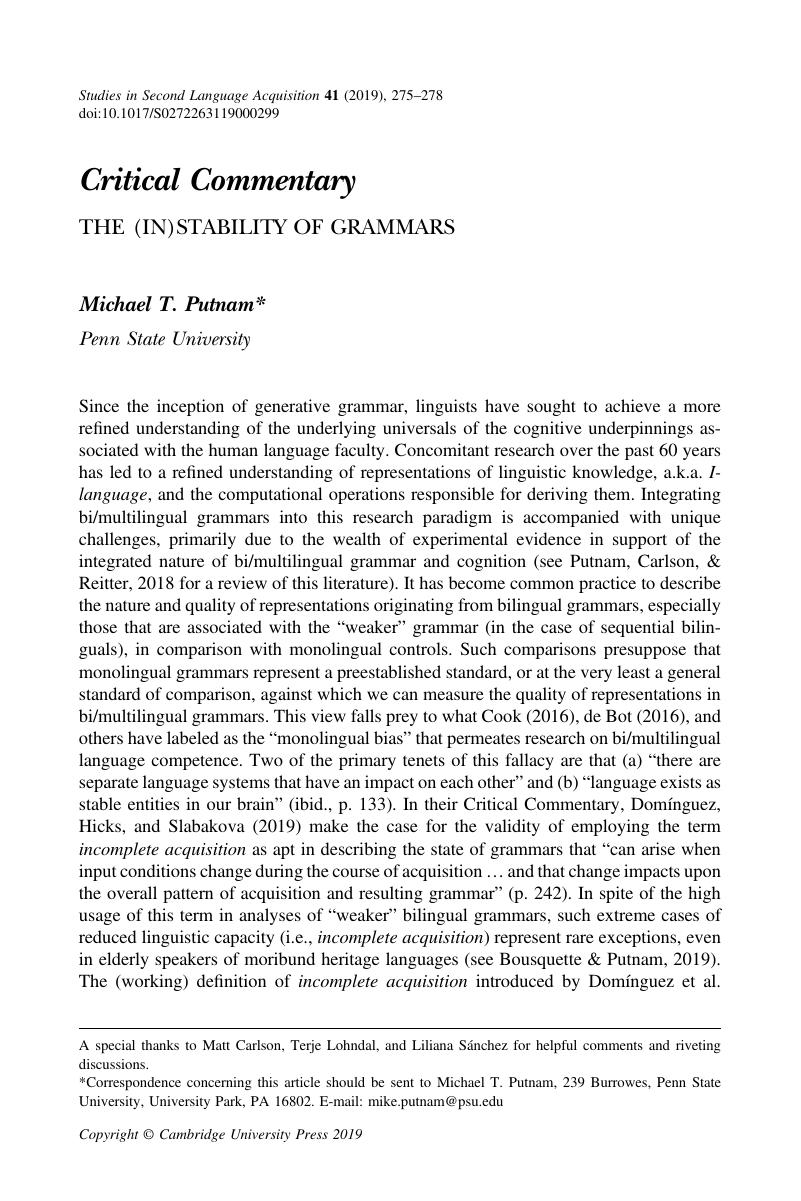Crossref Citations
This article has been cited by the following publications. This list is generated based on data provided by Crossref.
2019.
Heritage languages.
Vol. 58,
Issue. ,
Putnam, Michael T.
2020.
New Trends in Language Acquisition Within the Generative Perspective.
Vol. 49,
Issue. ,
p.
3.
Putnam, Michael T
2020.
Lexicalizing exponents in multilingual grammars.
Second Language Research,
Vol. 36,
Issue. 2,
p.
187.
Repiso-Puigdelliura, Gemma
and
Kim, Ji Young
2021.
The missing link in Spanish heritage trill production.
Bilingualism: Language and Cognition,
Vol. 24,
Issue. 3,
p.
454.
Hurtado, Irati
and
Montrul, Silvina
2021.
PRIMING DATIVE CLITICS IN SPOKEN SPANISH AS A SECOND AND HERITAGE LANGUAGE.
Studies in Second Language Acquisition,
Vol. 43,
Issue. 4,
p.
729.
Flores, Cristina
Rinke, Esther
and
Wagner, Claudia
2022.
To hón ich imma insistieat.
Linguistic Approaches to Bilingualism,
Vol. 12,
Issue. 3,
p.
251.
Uygun, Serkan
2022.
Processing pro-drop features in heritage Turkish.
Frontiers in Psychology,
Vol. 13,
Issue. ,
Uygun, Serkan
2023.
Vulnerability in processing definiteness: The case of heritage Turkish.
Frontiers in Psychology,
Vol. 14,
Issue. ,
Uygun, Serkan
Schwarz, Lara
and
Clahsen, Harald
2023.
Morphological generalization in heritage speakers: The Turkish aorist.
Second Language Research,
Vol. 39,
Issue. 2,
p.
519.
Putnam, Michael
and
Søfteland, Åshild
2024.
When covert modality sneaks into your grammar: wh-infinitives in American Norwegian.
Second Language Research,
Vol. 40,
Issue. 1,
p.
171.
D’Alessandro, Roberta
Putnam, Michael T
and
Terenghi, Silvia
2025.
Heritage Languages and Syntactic Theory.
Costa-Silva, Jean
Zhang, Shulin
and
Lee-Schoenfeld, Vera
2025.
The effects of bilingual proficiency on the acceptability of motion encoding strategies.
Bilingualism: Language and Cognition,
Vol. 28,
Issue. 2,
p.
444.
Hurtado, Irati
and
Montrul, Silvina
2025.
Does structural priming lead to contact-induced language change?.
Linguistic Approaches to Bilingualism,
Natvig, David
Pretorius, Erin
Putnam, Michael T.
and
Carlson, Matthew T.
2025.
Varieties of German in Contact Settings.
Vol. 10,
Issue. ,
p.
238.
Natvig, David
Putnam, Michael T.
and
Lykke, Alexander K.
2025.
Stability in the integrated bilingual grammar: Tense exponency in North American Norwegian.
Nordic Journal of Linguistics,
Vol. 48,
Issue. 1,
p.
57.
Hurtado, Irati
and
Montrul, Silvina
2025.
Is structural priming a possible mechanism of language change in heritage language grammars? Some evidence from accusative clitic doubling in Spanish.
Bilingualism: Language and Cognition,
Vol. 28,
Issue. 4,
p.
1149.


